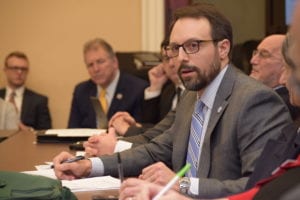Who is a member?
Our members are the local governments of Massachusetts and their elected and appointed leadership.

At the Feb. 11 meeting of the Local Government Advisory Commission, Danvers Town Manager Steve Bartha discusses the largely unknown capital costs that municipalities face for the remediation of PFAS contamination in water supplies.
As the Department of Environmental Protection works to finalize draft regulations that would establish a maximum level for PFAS compounds in drinking water, municipal officials continue to express concerns over emerging news about the class of potentially toxic chemicals.
The MassDEP is proposing a maximum contaminant level for drinking water of 20 parts per trillion of the sum of six PFAS compounds, and would require public water suppliers to test for PFAS compounds on a schedule, monitor levels on an ongoing basis, and take corrective action if the MCL is exceeded.
“As the full scope and cost of the need for remediation is not yet known, the MMA remains deeply concerned over how municipalities could pay for what has already been and will continue to be exorbitant cleanup costs,” the letter states, adding that any new regulatory standard should not result in new unfunded mandates.
Some communities have received PFAS remediation cost estimates for a single local water system that exceed the total statewide authorization in the closeout budget for this purpose, the MMA wrote.
At a Feb. 11 meeting of the Local Government Advisory Commission with the administration, Danvers Town Manager Steve Bartha stressed the need for state funding for capital infrastructure improvements associated with PFAS remediation and upgrading aging water systems.
At a Feb. 12 meeting of the MMA Policy Committee on Energy and the Environment, Easton Town Administrator Connor Read discussed his town’s experience with PFAS in drinking water. Easton detected PFAS in several of its wells using the parts per trillion scale in 2019, before MassDEP released its draft regulations, and considers itself a bellwether for municipalities, most of which have not yet conducted such tests while trying to estimate the costs they could face under required PFAS testing and remediation.
Easton published its test results and made an at-home PFAS-filter rebate program available for residents. The town is also advancing capital planning for what may be multimillion dollar treatment plant(s) in the coming years. For more information, visit www.easton.ma.us/departments/dpw/water_division/pfas_information.php.
In late December, the House passed a bill that would establish an interagency PFAS task force (H. 4256). The bill is currently before the Senate Committee on Ways and Means.
The Massachusetts Water Resources Authority Advisory Board is planning a PFAS Forum on June 18 in Needham that will feature MassDEP Commissioner Martin Suuberg and Rep. Kate Hogan. The MMA is also planning on participating in the forum.
Per- and polyfluoroalkyl substances (PFAS) are a family of chemicals used since the 1950s to manufacture stain-resistant, water-resistant and non-stick products, such as food packaging, outdoor clothing, carpets and leather goods, according to the MassDEP. Certain types of firefighting foam may contain PFAS.
PFAS are water soluble and releases can seep into surface soils, where they can leach into groundwater or surface water, and can contaminate drinking water. PFAS stay in the environment for a long time and do not break down easily. Studies indicate that exposure to sufficiently elevated levels of certain PFAS may cause a variety of health effects.